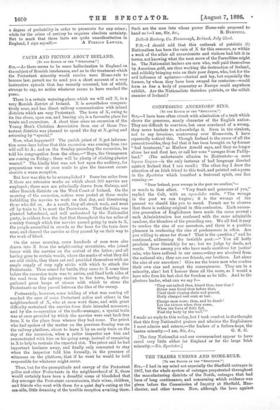CONFESSING ANCESTORS' srNs.
[To THE EDITOR OF THE " SPECTATOR:1 SIR,—I have been often struck with admiration of a trait which shows the generous, manly character of the English nation..
They are difficult to convince, but once convinced of a wrong, they never hesitate to acknowledge it. Even in the virulent, not to say ferocious, controversy over Home-rule, I have repeatedly noticed this. Though Ireland is the cause of all the present troubles, they feel that it has been brought on by former "bad treatment," as Mathew Arnold says, and they no longer abuse her and flout her, or call her sons "savages from Paddy-
land." (The unfortunate allusion to Hottentots—a mere lapsus linguce—is the only instance of bad language directed- against Ireland that I can recall.) The other day I drew the attention of an Irish friend to this trait, and pointed out a poem
in the Spectator which breathed a fraternal spirit, one line running :—
" Dear Ireland, your wrongs in the past we confess,"—
or words to that effect. "Very frank and generous of you," replied the Celt, with an agro-dolce smile. "The wrongs in the past we can forgive ; it is the wrongs of the present we should like you to mend. Permit me to observe that there is nothing original in this confession. Each succes- sive generation of Englishmen have made the same avowal ; each Administration has confessed with the same admirable candour, the blunders of the preceding one. We all find it easy to confess the sins of our ancestors, and there is a positive pleasure in confessing the sins of predecessors in office. Are you willing to atone for them That is the question ;" and he continued, addressing the invisible poet :—" You all hotly proclaim your friendship for us ; but we judge by deeds, not words. Those among you who have made sacrifices for justice' sake, who have suffered in our cause,—they are absolved from the national sin ; they are our friends, our brothers. Let alone
the sins of our ancestors ! Give me the brave men who confess their own sins and accept the consequences. They are in a minority, alas ! but I honour them all the more, as I would a hero who fires his last shot for freedom as he falls. And to the- glorious leader, what can we say ?- 'They out-talked thee, hissed thee, tore thee ?
Better men fared thus before thee, Fired their ringing shots and passed, Hotly charged and sank at last.
Charge once more, then, and be dumb !
Let the victors when they come, When the forts of folly fall, Find thy body by the wall.'"
I made no reply to this volley, but I took comfort in the thought that this fiery Nationalist praises and admires the Englishmen I most admire and esteem,—the leaders of a forlorn-hope, the beaten minority.—I am, Sir, eze., G. S. G.
[The fiery Nationalist and our correspondent appear to have- cared very little either for England or for the large Irish
minority.—En. Spectator.]


































 Previous page
Previous page